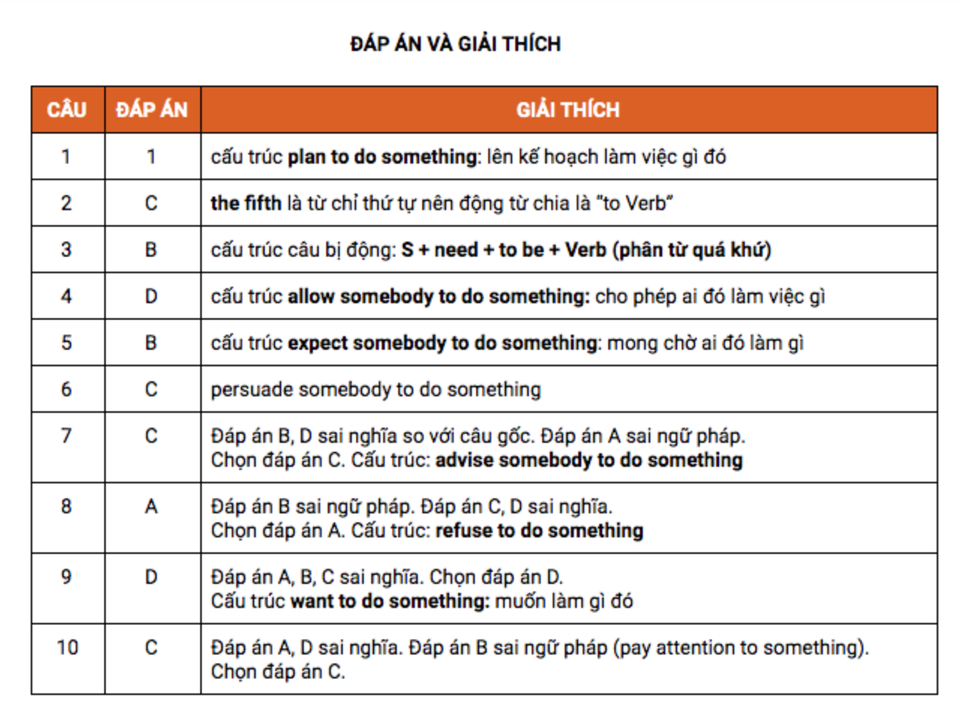Học tiếng Anh mỗi ngày: Trắc nghiệm kiến thức về động từ nguyên thể
(Dân trí) - Động từ nguyên thể (infinitive) là hình thức động từ nguyên dạng, không có sự biến đổi theo thì thời gian. Vậy bạn có biết trong tiếng Anh, động từ nguyên thể được sử dụng trong những trường hợp nào? Hãy thử sức với bài tập dưới đây nhé.

Có 2 loại động từ nguyên thể: động từ nguyên thể đi kèm với “to” (To Verb) và động từ nguyên thể không có “to” (Verb-bare).
Động từ nguyên thể dạng To Verb được sử dụng trong các trường hợp:
Làm chủ ngữ. VD: To become a pilot is my dream.
Làm bổ ngữ. Example: My wish is to become a pilot.
Làm tân ngữ (Object) đứng sau một số động từ (cấu trúc Verb + to Verb):
aim, afford, agree, appear, arrange, ask, attempt, beg, bother, care, decide, demand, deserve, determine, expect, fail, guarantee, happen, hesitate, hope, learn, manage, neglect, need, offer, plan, prefer, prepare, pretend, promise, prove, refuse, seem, swear, tend, threaten, volunteer, wait, want, wish, would like, would love |
VD1: I decide to have a trip to New York next month.
VD2: He failed to pass the test.
Đứng sau tân ngữ (Object) của một số động từ (cấu trúc Verb + Object + to Verb):
advise, allow, ask, beg, cause, command, convince, enable, encourage, expect, forbid, force, invite, instruct, need, oblige, order, permit, persuade, remind, request, require, teach, tell, train, urge, want, wam, wish, would like |
VD1: Marry invited us to join the party.
VD2: My mother wants us to visit our grandma every weekend.
Đứng sau một số tính từ (cấu trúc Adjective + to Verb)
able, unable, amazed, anxious, boring, certain, dangerous, delighted, difficult, disappointed, eager, easy, glad, good, happy, hard, important, lovely, pleased, ready, sorry, surprise, willing |
VD1: It’s hard to get up early in the morning.
VD2: I will be ready to perform within a few minutes.
Đứng sau các từ what/when/where/who/which/how trong mệnh đề danh từ.
VD1: I didn’t know what to do at that time.
VD2: She learnt how to cook delicious traditional dishes from her mother.
Đi với các từ chỉ thứ tự:
the first/the second/the third/…, the next, the last, the only |
VD: Jim was the last to enter the room.
Dùng để diễn đạt ý định, mục đích.
VD: We study English to get a well-paid job.
Dạng bị động của Động từ nguyên thể To Verb: to be + Phân từ Quá khứ
VD: This work needs to be finished.
Động từ nguyên thể không có To (Verb-bare) được sử dụng trong các trường hợp:
Đứng sau tân ngữ của một số động từ (cấu trúc Verb + Object + Verb):
help, let, make |
VD1: Don’t let him enter the room.
VD2: My mother help me do my homework.
Khi đứng sau các từ dưới đây, động từ có thể ở dưới dạng “Verb-bare” hoặc “Verb-ing” tùy theo ngữ cảnh:
feel, hear, notice, observe, overhear, see, watch |
- Khi hành động chỉ xảy ra 1 lần, hoặc chủ thể chứng kiến hành động từ đầu tới cuối, thì động từ sẽ ở dạng “Verb-bare”
VD: I watched the children shout at each other and I did nothing.
- Khi hành động lặp đi lặp lại, hoặc chủ thể chứng kiến giữa chừng của hành động, thì động từ sẽ ở dạng “Verb-ing”
VD: I heard the children shouting, so I ran upstair to see what was going on.
Một số cụm động từ đặc biệt:
hear tell (nghe nói), make believe (giả bộ), make do (cố xoay xở), let fall (rơi), let go (thả ra, buông tay) |
VD: I didn’t have a lot of money but I had to make do.
BÀI TẬP TRẮC NGHIỆM:
1. When we last met, you told me that you planned _____.
A. to move
B. move
C. moving
D. being moved
2. Connecticut was the fifth of the original thirteen states _____ the constitution of the United States.
A. ratified
B. have ratified
C. to ratify
D. ratify
3. The room needs _____ for the wedding.
A. to decorate
B. to be decorated
C. decorate
D. decorated
4. We don't allow you _____ in our house.
A. smoke
B. smoked
C. smoking
D. to smoke
5. You are late! I expected you _____ here earlier.
A. be
B. to be
C. being
D. to being
6. John and Karen persuaded me _____ the conference.
A. taken
B. taking
C. to take
D. take
7. ”If I were you, I would go to the doctor", he said to John.
A. He advised John that to go to the doctor.
B. He told John to become a doctor.
C. He advised John to go to the doctor.
D. He told John that he would go to the doctor.
8. My teacher wouldn't let me leave early.
A. My teacher refused to let me leave early.
B. Me teacher refused letting me leave early.
C. My teacher allowed me to leave early.
D. My teacher permitted me to leave early.
9. The man said that he didn't like to follow the protocol.
A. The man admitted not following the protocol.
B. The man accepted breaking the protocol.
C. The man promised to follow the protocol.
D. The man didn't want to follow the protocol.
10. “Do you mind helping me lift this heavy box?”, he said to her.
A. He ordered her to lift the heavy box.
B. “Do you pay attention on lifting this heavy box?”, he asked her.
C. He asked her to help him lift the heavy box.
D. She didn't want to help him lift the heavy box.
Đáp án bài trắc nghiệm:

Nguồn: JOLO English










